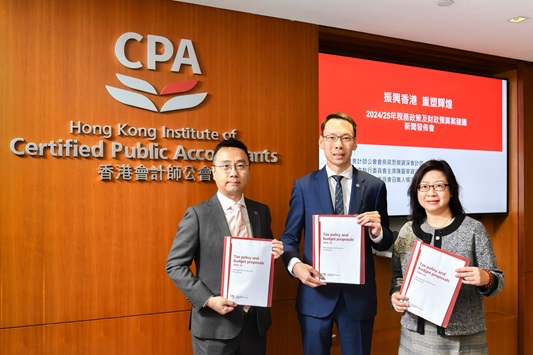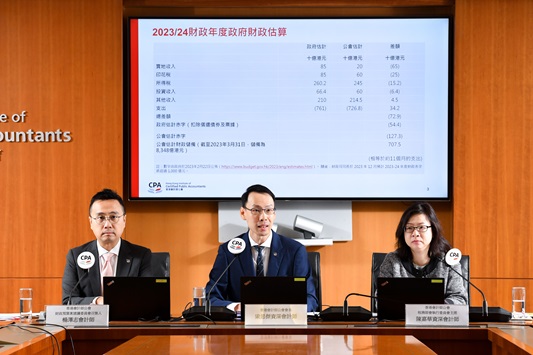HKICPA submits proposals for the Government budget to reinvigorate Hong Kong as a world city and magnet for investment and talent
Today, the Hong Kong Institute of Certified Public Accountants (“HKICPA”) has announced its tax policy and Government’s budget proposals for the 2024-25 fiscal year. Under the theme “Reinvigorate & Reinvent Hong Kong”, HKICPA puts recommendations forward to the Hong Kong Government under four key themes to retain Hong Kong’s vibrancy and attractiveness to investors and talents, as well as re-energise its status as a leading international financial centre.
HKICPA estimates that the fiscal deficit for 2023-24 will reach around HK$127.3 billion, slightly more than the updated forecast by the Government last month, and more than double the original forecast, as a result of lower land sales in the fiscal year and slower economic growth than originally expected, with lower stamp duty income from stock market and property transactions. “Hong Kong continues to face head winds and uncertainties internationally. The successive interest rate hikes by developed economies and ongoing geopolitical tensions, coupled with the talent shortage and an ageing population among other factors, have all added to the challenges faced by Hong Kong,” said Roy Leung FCPA, President of HKICPA. “While the measures launched by the Government last year to attract investment and talents, and to stimulate consumption have generated positive results, more can still be done to help Hong Kong maintain its vibrancy and attraction as a place to invest, live and work.”
Mr. Leung continues, “We should also review Hong Kong’s branding, investment promotion strategies, tax policies, as well as our overall competitiveness, in order to energize our status as a leading international financial centre and world city.”
Aimed at helping to reinvigorate Hong Kong, the HKICPA’s budget proposals include a wide range of measures under four main themes - covering stimulating investment, attracting and retaining talent and fostering innovation, supporting the wellbeing of the community and promoting sustainability, as well as reforming the tax system. Priority areas for investment to boost the economy include innovation and technology (“I&T”), research and development (“R&D”) and intellectual property (“IP”)-related business.
“In the present economic environment, while we appreciate the need to control expenditure and save costs, where possible, there are strong grounds for reviewing the competitiveness of our tax system, as well as looking at possible non-tax incentives for investment, and exploring other possible sources of revenue,” says Eugene Yeung, CPA, Convenor of the HKICPA’s Budget Proposals Task Force. “We agree with the Financial Secretary, who said in his Blog that ‘in the long run, the key to increasing government revenue lies in vibrant economic development,’ and that ‘we need to grow the economic pie’. Growing the economy is the aim of many of the measures that we have put forward in our submission, even though, in the short-term, this may result in foregoing some revenue”.
Attracting investment and talent, and promoting the Hong Kong brand
In addressing economic challenges, Hong Kong should look to boost its ranking in terms of global competitiveness. From a branding perspective, HKICPA believes the Government needs to reiterate its strong commitment to maintaining an investment-friendly environment, including the free flow of capital, linked exchange rate system, common law system and independent and impartial judiciary, among other related factors. It is important to promote Hong Kong as a vibrant, modern, sustainable and diverse community, and to tell the world the good stories of Hong Kong as a place where people of all backgrounds have been able to thrive and succeed.
The Institute highlights the need to conduct streamlining business processes, simplifying and digitalizing business licensing arrangements, where possible; looking closely at listing procedures, to facilitate more initial public offerings from a range of companies, while safeguarding corporate governance standards; introducing a corporate rescue regime and reinforcing Hong Kong’s English and Putonghua language skills.
To support the regional headquarters economy, in line with the initiative announced in the Chief Executive’s 2023 Policy Address, HKICPA proposes that the Government consider offering a 50% tax concession for relevant profits derived by qualifying regional headquarters. Group loss relief is another measure that would be welcomed by group companies which is available, in some form, in a number of major jurisdictions.
To support local innovation and entrepreneurship, HKICPA proposes incentives such as capped concessions for company setting-up expenses for standalone start-ups. It also suggests that the Government consider tax credits, with a lower profits tax rate for the first three years of profits, for start-ups in targeted industries, such as information technology (“IT”) and green industries. More generally, HKICPA suggests reviewing the two-tier profits tax regime and, potentially, either raising the threshold for the concessionary tax rate of 8.25% to above the current first HK$2 million of profit, or adjusting the tax rate downwards.
On the issue of attracting and retaining talent, HKICPA says that the Government should consider providing subsidies or tax concessions, such as double deductions, to targeted industries facing talent shortages to enable employers to offer more competitive salaries. Overseas talent should be offered a child education allowance, to encourage them to raise their families in Hong Kong.
In view of Hong Kong’s declining birth rate and an ageing population, and the resulting constraints on the workforce, HKICPA recommends measures to encourage childbirth. These include supporting employers to offer more flexible, family-friendly policies, e.g., allowing new parents to work from home in the first two years after the birth of a child, or, where this is not practicable, subsidizing the cost of a helper or childcare services for two years after childbirth. Given people’s longer lifespans, employers should also be incentivised, for example, by providing enhanced tax deductions for hiring experienced workers and skilled retirees.
R&D, IP-businesses and digitalization
One of the roles envisaged for Hong Kong under the 14th National Five-Year Plan is an IP trading hub, which is closely linked to the development of I&T and R&D in Hong Kong. “The Government can consider R&D tax credits for start-up businesses, which are quite common overseas. We also recommend making the rules for the existing tax incentives, such as the enhanced R&D tax deductions of up to 300% of relevant expenditure, more flexible and business friendly”, says Sarah Chan, FCPA, Chair of Taxation Faculty Executive Committee. “Other jurisdictions in the region are vying for the same business, so there needs to be scope for greater flexibility in how our rules are applied in order to remain competitive,” adds Ms. Chan.
To enhance the overall digital transformation in the business community, HKICPA suggests subsidizing small and medium enterprises (“SMEs”) to engage an IT professional for up to 3 years to help them upgrade their systems, equipment, and technical infrastructure. This could include engaging a suitable accountant to help them upgrade their accounting systems in readiness for the introduction of a mandatory tax e-filing regime. In addition, HKICPA makes recommendations on funding practical training in I&T and digitalization, as well as artificial intelligence and data analytics.
Build a happier and healthier community in a greener Hong Kong
To promote a healthier and more active lifestyle among the community and relieve pressure on the public healthcare system, HKICPA proposes to provide a tax deduction of up to HK$12,000 per person for expenses on approved sports courses and activities for taxpayers and dependants. Also, it is proposed that the maximum tax deductions under the Voluntary Health Insurance Scheme (“VHIS”) could be increased to HK$12,000, and consideration given to extending the coverage scope of VHIS to other programmes, such as outpatient services.
The Institute calls for more support for the development of a vibrant and creative local arts culture scene and a wider range of sports events to promote international exchanges, which can help boost tourism as well as benefiting the local community
To provide some relief for middle-class and other taxpayers, the Government should consider providing a tax reduction of 100%, subject to a ceiling of HK$12,000 on salaries tax, tax under personal assessment and profits tax for 2023-24. Additionally, basic personal allowances should be increased, at least in line with inflation, alongside a general review of the allowances for dependants. Furthermore, given the high interest rate environment and rising rental costs, the home loan interest deduction/ rental allowance should be increased to HK$110,000 annually. Certain rates waivers and electricity subsidies are also proposed.
Regarding sustainable development, the Government is committed to achieving carbon neutrality by 2050 and has set interim targets to reduce carbon emissions by 50% before 2035. Major new infrastructure projects should take these targets on board, in terms of designs, materials and processes, etc. HKICPA also recommends various specific measures in relation to electric vehicles (“EVs”) and green public transport, including retaining the first registration tax concessions on electric private cars and expanding charging facilities; on energy-efficient buildings, including incentivizing construction of buildings that meet higher energy-efficiency standards; and on green finance, such as allowing tax deductions for companies purchasing carbon credits as part of their carbon reduction strategy.
As the future standard setter for sustainability reporting standards in Hong Kong, HKICPA emphasizes the importance of capacity building through recognized education courses and certifications in ESG and sustainable finance.
Building on our strengths – Reassessing Hong Kong’s tax system
In addition to a low-rate and relatively simple tax regime, certainty of tax treatment has been another important factor of the tax system affecting Hong Kong’s attraction as a place of investment for multinational enterprises. HKICPA continues to call for a broader review of the tax system to improve certainty, ensure the overall competitiveness of the regime, and explore options to ensure Hong Kong’s public finances remain secure and sustainable in the long-term.
To download the full budget proposal "Reinvigorate and reinvent Hong Kong ", please visit the following link:
https://www.hkicpa.org.hk/-/media/Document/APD/Gov-Budget/Budget-proposals-2024-25_submn.pdf

Mr. Roy Leung FCPA, President of HKICPA (Centre), Mr. Eugene Yeung CPA, Convenor of Budget Proposals Task Force (Left) and Ms. Sarah Chan FCPA, Chair of Taxation Faculty Executive Committee (Right) presented the HKICPA’s 2024-25 Budget Proposals “Reinvigorate and reinvent Hong Kong”, which includes a range of recommendations under four key themes.

Aimed at helping to reinvigorate Hong Kong, the HKICPA’s budget proposals include a wide range of measures under four main themes for attracting investment and talents to boost the economy.




